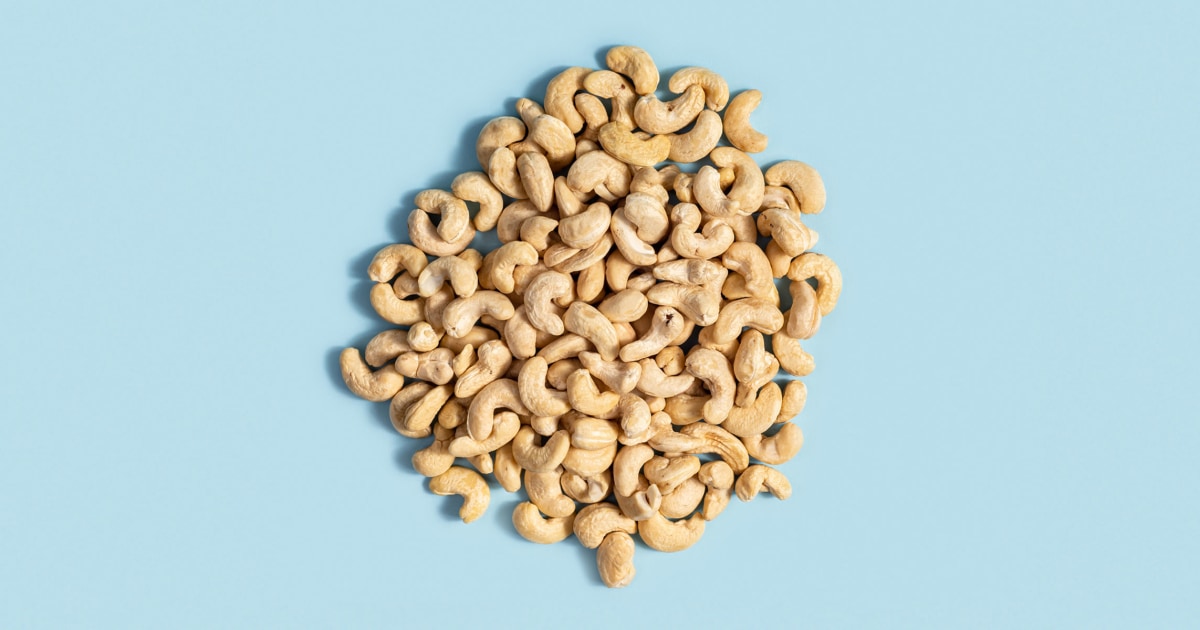Nuts are a nutritious and portable food that make for an excellent snack on the go. Cashews in particular are easy to enjoy on their own and recently made TODAY.com’s list of healthiest nuts.
In addition to their buttery, sweet taste, studies show cashews might help lower blood pressure and boost heart health, Christine Byrne, a registered dietitian and the owner of Ruby Oak Nutrition, previously told TODAY.com.
They’re versatile, too, registered dietitian and author Erin Palinski-Wade tells TODAY.com. “You can blend them into a creamy cashew butter, toss them into stir-fries or curries, use them to make rich, dairy-free sauces. You can also sprinkle them over salads or oatmeal for crunch or enjoy them alone as a crunchy snack.”
Here’s what to know about the health benefits of cashews.
Cashews’ Nutrition
In 30 grams of cashews, you’ll find:
170 calories11.7 grams fat10.9 grams carbohydrate1.23 grams fiber5.22 grams protein75.3 micrograms of magnesiumOther Cashew Nutrients
Technically, a seed from the cashew tree, cashews are loaded with tons of nutrients you’ll typically find in nuts.
“Just one ounce provides close to your entire daily needs for copper — key for energy production and healthy connective tissue,” says Palinksi-Wade. “They’re also a great source of magnesium and manganese (both around 20–25% of your daily needs), which support muscle, nerve and metabolic health.”
You can also count on cashews for their phosphorus, which benefits your bones and energy metabolism. They also pack zinc for immunity and wound healing, says Palinski-Wade. The vitamin K in cashews helps with blood clotting and bone strength, too.
Another bonus? “Cashews even add a moderate boost of plant-based protein (about 5 grams per ounce) along with B vitamins, like thiamine and B6, to keep your brain and energy levels steady,” Palinski-Wade says.
Cashews Benefits
Thanks to this nut’s nutrient profile, cashews can help to lower LDL “bad” cholesterol levels, a big deal for heart health, says Palinksi-Wade. About 10% of adults over 20 in the U.S. have high cholesterol, according to the Centers for Disease Control and Prevention.
Cashews can also play a role in lowering inflammation levels, adds Palinksi-Wade. Plus, they support bone health. “When incorporated into a meal or snack, especially as a replacement for a food high in refined carbohydrates, they may also help to promote improved blood sugar levels,” Palinki-Wade says.
Cashews’ fiber and protein content can help keep you full in between meals. While cashews can’t directly promote weight loss, they promote satiety, which can help reduce overall calorie intake, thus aiding in weight loss, Palinksi-Wade explains.
Cashew Risks
When raw, cashews are toxic, but the kind you’ll find at the grocery store have been treated to be safe for consumption, Palinksi-Wade explains. “When you buy a commercially sold cashew, it isn’t actually raw. They have been heat-treated to remove toxic urushiol found in their shells.”
Those susceptible to kidney stones may want to keep an eye on their cashew intake “due to the high oxalate content of cashews,” says Palinki-Wade. Oxalate is a chemical the body makes that’s found in certain foods, but can cause health problems in high quantities, according to the Mayo Clinic.
Palinski-Wade also recommends avoiding cashews if you have a tree nut allergy.

